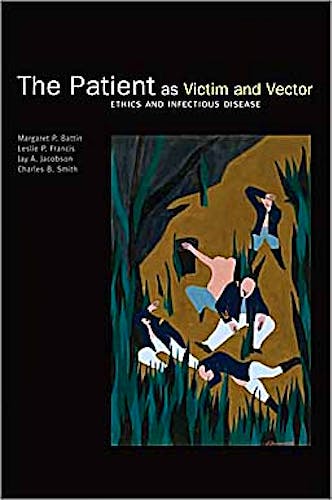

No hay productos en el carrito



The Patient as Victim and Vector. Ethics and Infectious Disease
Battin, M. — Francis, L. — Jacobson, J. — Smith, C.
1ª Edición Noviembre 2008
Inglés
Tapa blanda
576 pags
1200 gr
16 x 24 x null cm
ISBN 9780195335835
Editorial OXFORD UNIVERSITY PRESS
LIBRO IMPRESO
-5%
31,18 €29,62 €IVA incluido
29,98 €28,48 €IVA no incluido
Recíbelo en un plazo de
2 - 3 semanas
- A collaboration among scholars with expertise in bioethics, health law, and infectious disease
- Develops a normative framework sensitive to situations of disease transmission
- Will have a major impact on the fields of bioethics and public health ethics
Bioethics emerged at a time when infectious diseases were not a major concern. Thus bioethics never had to develop a normative framework sensitive to situations of disease transmission. The Patient as Victim and Vector explores how traditional and new issues in clinical medicine, research, public health, and health policy might look different in infectious disease were treated as central. The authors argue that both practice and policy must recognize that a patient with a communicable infectious disease is not only a victim of that disease, but also a potential vector- someone who may transmit an illness that will sicken or kill others. Bioethics has failed to see one part of this duality, they document, and public health the other: that the patient is both victim and vector at one and the same time.
The Patient as Victim and Vector is jointly written by four authors at the University of Utah with expertise in bioethics, health law, and both clinical practice and public health policy concerning infectious disease. Part I shows how the patient-centered ethic that was developed by bioethics- especially the concept of autonomy- needs to change in the context of public health, and Part II develops a normative theory for doing so. Part III examines traditional and new issues involving infectious disease: the ethics of quarantine and isolation, research, disease screening, rapid testing, antibiotic use, and immunization, in contexts like multi-drug-resistant tuberculosis, syphilis, hepatitis, HIV/AIDS, and HPV. Part IV, beginning with a controversial thought experiment, considers constraint in the control of infectious disease, include pandemics, and Part V 'thinks big' about the global scope of infectious disease and efforts to prevent, treat, or eradicate it.
This volume should have a major impact in the fields of bioethics and public health ethics. It will also interest philosophers, lawyers, health law experts, physicians, and policy makers, as well as those concerned with global health.
AUTHOR INFORMATION
Margaret P Battin, Professor of Philosophy and Medical Ethics, University of Utah, USA, Leslie P Francis, Professor of Philosophy and Law, University of Utah, USA, Jay A Jacobson, Professor Internal Medicine, USA, and Charles B Smith, Professor Emeritus of Medicine, USA
TABLE OF CONTENTS
Preface
Part I: Seeing Infectious Disease as Central
1: Seeing Infectious Disease as Central
2: The Biological Basics of Infectious Disease
3: Characteristics of Infectious Disease that Raise Distinctive Challenges for
Bioethics
4: How Infectious Disease Got Left Out of Bioethics
5: Closing the Book on Infectious Disease: The Mischievous Consequences for
Public Health
Part II: Theoretical Considerations
6: Embedded Autonomy and the "Way-Station Self"
7: Thinking about Infectious Disease: The Multiple Perspectives of the PVV View
Part III: Dilemmas Old and New: Health Care Dilemmas Through the Lens of Infectious
Disease
8: Old Wine in New Bottles: Traditional Issues in Bioethics from the Victim/Vector
Perspective
9: From the Magic Mountain to a Dying Homeless Man and His Dog: Imposing Isolation
and Treatment in Tuberculosis Care
10: The Ethics of Research in Infectious Disease: Experimenting on This Patient,
Risking Harm to That One
11: Vertically-Transmitted Infection: Are the Medical and Public Health Responses
Consistent?
12: Should Rapid Tests for HIV Infection Now Be "Mandatory" During
Pregnancy or in Labor?
13: Antimicrobial Resistance
14: Immunization and the HPV Vaccine
Part IV: Constraints and the Question of What We Owe Each Other As Victims and
Vectors
15: A Thought Experiment: Rapid Testing for Infectious Disease in Airports and
Places of Public Contact
16: Constraints in the Control of Infectious Disease
17: Pandemic Planning: What is Ethically Justified?
18: Compensation and the Victims of Constraint
19: Pandemic Planning and the Justice of Health Care Distribution
Part V: Making Use of the PVV View
20: Thinking Bi: Emerging Global Efforts for the Control of Infectious Disease
21: "The Patient as Victim and Vector" Approach as a Critical and
Diagnostic Tool for Philosophical Ethics and Public Policy
References
© 2025 Axón Librería S.L.
2.149.0